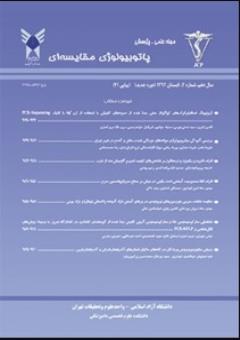Investigating the effect of eugenol on the pancreas of Wistar rats with polycystic ovary syndrome induced by estradiol valerate
Subject Areas : Journal of Comparative PathobiologyZahra Kokabiyan 1 , زهرا Hajebrahimi 2 * , پریچهره Yaghmaei 3 , S.B Jameie 4
1 - Department of Biology, Science and Research Branch, Islamic Azad University, Tehran, Iran
2 - عضو هییت علمی پژوهشگاه هوا و فضا
3 - Department of Biology, Science and Research Branch, Islamic Azad University, Tehran, Iran
4 - مرکز تحقیقات علوم اعصاب، دانشکده پیراپزشکی، دانشگاهعلوم پزشکی ایران
Keywords: Polycystic ovarian syndrome, Eugenol, Pancreas, Rat ,
Abstract :
Polycystic ovary syndrome (PCOS) is the most common endocrine disease in women of reproductive age. The cause of PCOS is still unknown, however, studies have shown that insulin resistance plays a role in the pathogenesis of this syndrome. In addition to insulin resistance, it has been shown that some women with PCOS have changes in the function of beta cells. Eugenol is a substance with anti-inflammatory and antioxidant properties. The aim of this study was to investigate the therapeutic effect of eugenol on pancreatic tissue in female Wistar rats with PCOS. In this experimental study, 30 Wistar rats weighing 200±20 grams were used. To induce polycystic ovary syndrome, estradiol valerate at a dose of 4 mg/kg was injected intraperitoneally for 28 days. Animals were divided into 5 groups. The control group and PCOS received normal food, the sham group received solvant, and two treatment groups with intraperitoneal injection of eugenol with doses of 12 and 24 mg/kg. Then, the pancreas of the animals was examined histologically after being fixed, prepared and stained by the H&E method. Pancreas tissue studies showed an increase in inflammatory cells, an increase in necrotic cells and an increase in destroyed islets in the PCOS group. Administration of eugenol improved the histological characteristics of the pancreas. Treatment with eugenol with doses of 12 or 24 mg/kg significantly reduced the number of inflammatory cells, necrotic cells and destroyed islets (p≤0.05). The findings showed that eugenol can be effective in improving PCOS disease and reducing its harmful effects.
1. Rosenfield RL, Ehrmann DA. The pathogenesis of polycystic ovary syndrome (PCOS): the hypothesis of PCOS as functional ovarian hyperandrogenism revisited. Endocr Rev. 2016; 37(5):467‐520.
2. Paschou SA, Palioura E, Ioannidis D, Anagnostis P, Panagiotakou A, Loi V, Karageorgos G, Goulis DG, Vryonidou A. Adrenal hyperandrogenism does not deteriorate insulin resistance and lipid profile in women with PCOS. Endocr Connect. 2017; 6(8):601‐606.
3.
3. Ye W, Xie T, Song Y, Zhou L. The role of androgen and its related signals in PCOS. J Cell Mol Med. 2021; 25:1825–1837.
4. Tammannavar P, Pushpalatha C, Jain S, Sowmya SV. An unexpected positive hypersensitive reaction to eugenol. Case Rep. 2013;2013: bcr2013009464.
5. Chaieb K, Hajlaoui H, Zmantar T, Kahla-Nakbi AB, Rouabhia M, Mahdouani K, Bakhrouf A. The chemical composition and biological activity of clove essential oil, Eugenia caryophyllata (Syzigium aromaticum L. Myrtaceae): a short review. Phytotherapy Research. 2007; 21:501-506.
6. Cho JS, Kim TH, Lim J-M, Song J-H. Effects of eugenol on Na+ currents in rat dorsal root ganglion neurons. Brain research. 2008;1243:53-62.
7. Manikandan P, Murugan RS, Priyadarsini RV, Vinothini G, Nagini S. Eugenol induces apoptosis and inhibits invasion and angiogenesis in a rat model of gastric carcinogenesis induced by MNNG. Life sciences. 2010;86(25):936-41.
8. Fonsêca DV, Salgado PR, Neto HdCA, Golzio AM, Caldas Filho MR, Melo CG, et al. Ortho-eugenol exhibits anti-nociceptive and anti-inflammatory activities. Int immunopharmacol. 2016;38:402-8.
9. Fathy M, Fawzy MA, Hintzsche H, Nikaido T, Dandekar T, Othman EM. Eugenol exerts apoptotic effect and modulates the sensitivity of HeLa cells to cisplatin and radiation. Molecules. 2019; 24:3979.
10. Gill AO, Holley RA. Inhibition of membrane bound ATPases of Escherichia coli and Listeria monocytogenes by plant oil aromatics. Int J Food Microbiol. 2006;111:170–174.
11. Committee for the update of the guide for the care and use of laboratory animals. Guide for the care and use of laboratory animals. Washington: National Academy Press. 1996.
12. Al-kataan MA., Ibrahim M.A., Al-jammas M.H.H., Shareef Y.S., Sulaiman M.A. 2010. Serum Antioxidant Vitamins Changes in Women with Polycystic Ovarian Syndrome. Journal of the Bahrain.Medical Society, 22(2):68-71.
13. Pahlevani P, Mosavi SM, Rastgoo Haghi AR, Lahotian H, Esna Ashari F, Alizadeh Z. Study of the effects of stachys lvandulifolia alcoholic extract on histomorphometry of endometrium in polycystic ovarian syndrome rat model. Scientific Journal of Hamadan University of Medical Sciences. 2015; 20(3): 40-48.
14. Zhang B, Wang J, Shen S, Liu J, Sun J, Gu T. Association of androgen excess with glucose intolerance in women with polycystic ovary syndrome. BioMed Research Int. 2018; 2018:6869705.
15. Xu W, Morford J, Mauvais-Jarvis F. Emerging role of testosterone in pancreatic beta cell function and insulin secretion. J Endocrinol. 2019; JOE-18-0573.
16. Navarro G, Allard C, Morford JJ, Xu W, Liu S, Molinas AJ. Androgen excess in pancreatic beta cells and neurons predisposes female mice to type 2 diabetes. JCI Insight. 2018;3(12): e98607.
17. C Malin SK, Kirwan JP, Sia CL, Gonzalez F. Pancreatic beta cell dysfunction in polycystic ovary syndrome: role of hyperglycemia-induced nuclear factor-kappa B activation and systemic inflammation. American Journal of Physiology. Endocrinol Metabol. 2015; 308(9):E770–E777.
18. Kokabiyan Z, Yaghmaei P, Behnamedin Jameie S, Hajebrahimi Z (2022) Therapeutic effects of eugenol in polycystic ovarian rats induced by estradiol valerate: a histopathological and a biochemical study. Int J Fertil Steril. 2022; 16(3):184-91.
19. Kaya C, Pabuccu R, Berker B. Plasma interleukin-18 levels are increased in the polycystic ovary syndrome: Relationship of carotid intima-media wall thickness and cardiovascular risk factors. Fertil Steril. 2010; 93:1200–1207.
20. Garg D, Merhi Z. Relationship between advanced glycation end products and steroidogenesis in PCOS. Rep Biol Endocrinol. 2016;14:71.

